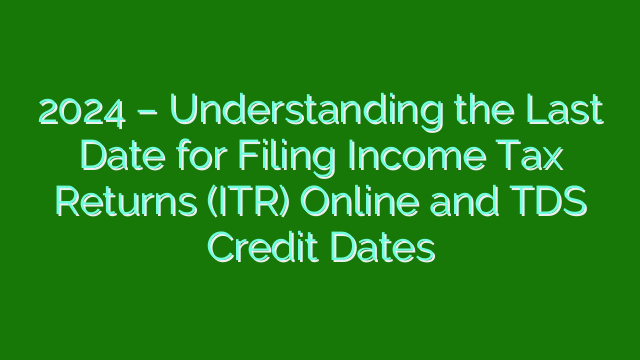2024 – Understanding the Last Date for Filing Income Tax Returns (ITR) Online and TDS Credit Dates
Filing Income Tax Returns (ITR) is a crucial responsibility for taxpayers in India. It ensures compliance with tax laws and helps in maintaining a transparent financial record. This blog will guide you through the important dates for filing ITR online and understanding TDS credit dates.
Importance of Filing ITR on Time
Filing your ITR on time is essential for several reasons:
- Avoid Penalties: Late filing can attract penalties and interest on the tax due.
- Claim Refunds: Timely filing allows you to claim refunds for excess tax paid.
- Loan Approvals: Banks often require ITR receipts for loan approvals.
- Legal Compliance: It ensures you are legally compliant with tax laws.
Key Dates for Filing ITR Online
The Income Tax Department of India has set specific deadlines for filing ITR. Here are the key dates you need to remember:
- For Individuals and HUFs (Non-Audit Cases): The last date to file ITR is 31st July of the assessment year. For instance, for the financial year 2023-24, the due date is 31st July 20241.
- For Businesses Requiring Audit: The due date is 30th September of the assessment year1.
- For Businesses Requiring Transfer Pricing Report: The due date is 30th November of the assessment year1.
Steps to File ITR Online
Filing ITR online is a straightforward process. Here’s a step-by-step guide:
- Register on the Income Tax e-Filing Portal: Visit the Income Tax e-Filing Portal and register using your PAN.
- Select the Appropriate ITR Form: Choose the correct ITR form based on your income sources.
- Fill in the Details: Enter your personal details, income details, and tax-saving investments.
- Verify Your Return: Verify the details and submit the return.
- E-Verify Your Return: Use Aadhaar OTP, net banking, or other methods to e-verify your return.
TDS Credit Dates and Compliance
Tax Deducted at Source (TDS) is a mechanism where tax is deducted at the source of income. Understanding TDS credit dates is crucial for both deductors and deductees.
TDS Payment Due Dates
The due dates for depositing TDS are as follows:
Table
| Quarter Ending | Month of Deduction | Due Date for Depositing TDS |
|---|---|---|
| 30th June | April | 7th May |
| May | 7th June | |
| June | 7th July | |
| 30th September | July | 7th August |
| August | 7th September | |
| September | 7th October | |
| 31st December | October | 7th November |
| November | 7th December | |
| December | 7th January | |
| 31st March | January | 7th February |
| February | 7th March | |
| March | 30th April |
TDS Return Filing Due Dates
The due dates for filing TDS returns are as follows:
Table
| Quarter Ending | TDS Return Due Date |
|---|---|
| 30th June | 31st July |
| 30th September | 31st October |
| 31st December | 31st January |
| 31st March | 31st May |
Consequences of Missing Deadlines
Failing to meet the deadlines for ITR filing and TDS compliance can lead to several consequences:
- Penalties and Interest: Late filing of ITR can attract a penalty of up to ₹10,000 under Section 234F. Additionally, interest under Section 234A, 234B, and 234C may be levied2.
- Disallowance of Expenses: For businesses, non-compliance with TDS provisions can lead to disallowance of expenses under Section 40(a)(ia).
- Prosecution: In severe cases, non-compliance can lead to prosecution under Section 276CC.
Tips for Timely Compliance
To ensure timely compliance with ITR and TDS deadlines, consider the following tips:
- Set Reminders: Use digital calendars or apps to set reminders for important dates.
- Maintain Records: Keep all financial records and documents organized.
- Seek Professional Help: If you find the process complex, seek help from a tax professional.
- Use Online Tools: Utilize online tools and platforms like ClearTax for hassle-free filing.
Conclusion
Filing your ITR on time and complying with TDS credit dates is crucial for maintaining financial discipline and avoiding legal hassles. By understanding the key dates and following the steps outlined in this blog, you can ensure timely compliance and enjoy the benefits of a transparent financial record.
For more detailed information, you can visit the ClearTax website.
1: Income Tax Department 2: ClearTax
